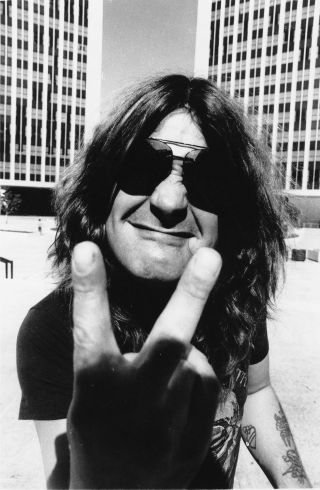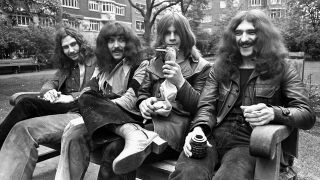There’s an old saying that goes, ‘If you remember the 1960s, you weren’t there.’ But there’s another, less well-known motto for the decade that follows: ‘If you remember the 1970s, then your name probably isn’t Ozzy Osbourne.’
At the end of the 1960s, Ozzy, née John, was a virtually penniless member of Black Sabbath, an unlikely quartet of faux-Satanic urchins from Aston, Birmingham. But Sabbath’s slow-paced, bludgeoning music soon captivated a new generation of grim-faced, gloom-cast rock fans. They enjoyed success that no one could’ve imagined – least of all Old Nick himself.
Ozzy was swept aboard a frenzied rock’n’roll fairground ride. Sabbath blasted into the charts and toured the world in a furious haze of alcohol and drugs. The good times were often outweighed by the bad as greedy managers consumed huge slices of the band’s pie, leaving Ozzy – with guitarist Tony Iommi, bassist ‘Geezer’ Butler and drummer Bill Ward – bewildered as to why so much success was reaping so little financial reward.
From their self-titled debut in 1970 right up to 1978’s Never Say Die!, Ozzy’s final 70s album before being sacked, Black Sabbath concocted a whole host of magnificent, monolithic sounds. Oh yeah, and they single-handedly defined the heavy metal genre in the process.
Here Ozzy racks his brain and reminisces to Geoff Barton about his lost decade, and how it proved to be the first of several…
Black Sabbath’s first single, Evil Woman, Don’t You Play Your Games With Me, was released right at the beginning of the 70s. But it flopped.
We were glad. Have you ever heard the original? It was by a band called Crow. We did it because the record company [Fontana] didn’t know what the fuck Sabbath were all about. We didn’t want to do it – it was a cover by a remote band we’d never even heard of. I don’t even know what happened to them. But the record company said: “If you want us to release your album, then you’ve got to do this Evil Woman… thing.” We were so resentful about doing it, so when it was a flop, we were relieved. Thank fuck for that.
Do you remember much about Sabbath’s very early years?
We were originally called Earth. We started off as a six-piece band – we even had a saxophone player. We used to go to rehearse in this community centre in Six Ways, Aston. Across the road was a movie theatre. There was this horror film on, and either Tony [Iommi] or Geezer [Butler], I can’t remember exactly who, said: “Isn’t it weird that people like to pay money to see scary films? Why don’t we start writing scary music?” That’s how it happened.
We wrote the song Black Sabbath and everybody thought we were a bunch of Boris Karloffs – but we didn’t have a clue. We started reading Dennis Wheatley books and everything, but we all thought black magic was just a fucking joke. It wasn’t for real. But when Sabbath took off we started getting invites to black masses, and to so-and-so’s cemetery opening. We thought: ‘Is this a wind-up?’
You were shunted on to the more progressive Vertigo label for your first album, 1970’s Black Sabbath.
The record cost us 800 quid. If you listen to side two, there’s a couple of decent songs on it but the rest is like a fucking jam session. We recorded it in a room that was hardly bigger than a toilet. But we were naïve; we thought: ‘That’s the way you make records.’ We didn’t know any better.
I remember Jim Simpson, our first manager, telling me it had entered the British chart at No.17, and I said: “Yeah, pull the other fucking leg.” But it stayed in the Top 20 for months. I don’t know how high it got (it peaked at No.8) but it stayed around for a long time. Jim said we could have a few more quid for the next album. So we went to Island Recording Studios, which was a brand new studio, to do Paranoid.
Paranoid, the single, was in the Top 5. When Sabbath appeared on Top Of The Pops, no one had ever seen anything like it before. You were like wild animals.
I was chuffed because my mum and dad could see me on the telly. I’d never been on telly in my life but I took it in my stride. As I’ve got older I’ve got more nervous. You don’t want to be around me before I go on stage these days. I’ve got stage fright fucking terrible now. Because I’m clean and sober, I can’t even have a swift one or a snort of something to relax. I have a lot of fucking fear inside me. I recently found out from a therapist that all I was doing in the early years was self-medicating. I was compensating for the pressurised lifestyle of rock’n’roll by drinking and taking drugs.
In 1971 Sabbath played the Royal Albert Hall.
That was a big show. I couldn’t believe it. One minute I was playing the Marquee club with a pyjama shirt on, no shoes, with my knees hanging out of my jeans, and the next I was on stage at the Albert Hall. All our parents were in the audience. I thought: “I’m going to fucking die as soon as we start playing.” I can’t remember much about it, to be honest. One day I was a nobody, the next day I’ve got an album in the charts and I’m playing the Albert Hall. It was weird.
Before the serious, heavy drugs took their toll, all we used to do was smoke a couple of joints. But success hit us hard. Instead of sharing half a bitter between us, we started to get well and truly smashed. I remember when we all got cars, and I hadn’t even got a driving licence. I was permanently fucked up.
Paranoid was originally going to be called War Pigs.
The cover’s of three guys in pink leotards. Yes, the album was going to be called War Pigs, and pigs are pink, hence the pink fucking thing. Our producer, Rodger Bain, said we needed an extra couple of minutes to fill up the album. “Just do anything,” he said. So in no time at all Paranoid was written.
I wasn’t keen on it at first. I thought it was a rip-off of Led Zeppelin. The Paranoid riff reminded me of Whole Lotta Love (In fact, the riff recalls Dazed And Confused). I preferred songs like Iron Man. But it was all extremely spontaneous in those days. We used to write songs on the way to gigs, and I used to invent the lyrics – there are bootlegs out there of War Pigs where I’m singing about my mum’s cat.
- Bill Ward on the early days of Sabbath and drumming on LSD
- Unboxing the Black Sabbath Ten Year War box set – Golden Gods edition
- Our TeamRock+ offer just got bigger. And louder.
- Tony Iommi interview: Witches, churches and Top Of The Pops
By autumn 1972 you were already on to your fourth album, Vol. 4.
We wanted to call it Snowblind, because we did so much coke making that record, but the record company said no. We added the credit: ‘We’d like to thank the great Los Angeles Coke-A-Cola Company.’ People thought it was an error, a typing mistake. If only they’d known the half of it!
But that’s when we started to believe in our own hype, in my opinion. The beginning of the end was the following album, Sabbath Bloody Sabbath [released in late 1973], because our managers were ripping us off. We started legal proceedings against them, and employed dozens of lawyers. But then we found out they were worse than our managers. We didn’t know fuck all about the law. All we knew was that every time we went on the road it was to pay off the fucking lawyers. I never saw a royalty cheque.
When Sabbath weren’t in the studio, you were out on the road. You must have played with hundreds of other bands in the 70s. Which was your favourite?
I really enjoyed touring with Black Oak Arkansas. Their frontman, Jim Dandy, used to do this duet of [Wings’] Maybe I’m Amazed with a girl singer. I used to enjoy that, because I’m a massive Beatles fan. I played with Black Oak’s drummer, Tommy Aldridge, when I went solo. He was phenomenal.
I also loved playing with Humble Pie. I’m a big Steve Marriott fan – when he died, a part of me died, too. I remember when we did a show together in the Akron Rubberbowl – it was an old amphitheatre in the open air. It was unbelievable, Humble Pie were shovelling coke up their noses like it was going out of style. They must have done 20 grams before they went on stage. But Marriott was incredible. Somehow, he was better than ever. I remember looking for the fucking Revox; Marriott was so good I thought he was lip-synching.

At the end of the 70s you got kicked out of Sabbath.
I left first, then I came back, then they tried out this guy called Dave Walker. I was like a fish out of water. My last album of the 70s with Sabbath was Never Say Die!. Everybody was fucked up. But no matter how fucked up I was, I’d still be up early in the morning because I’ve always had this sleeping disorder. So I’d be up at 7 o’clock and out of my mind by 11, drinking and getting fucked up.
The rest of Sabbath wouldn’t get up until late because they’d been doing their drugs, or whatever it was, all night. They’d turn up and jam, but by that time I’d lost the spark, you know? Even to this day I don’t know the details, but I assume – and I’m very likely wrong – that Tony wanted me out of the band.
At that time you were involved with the Ardens, your wife Sharon’s family.
I went to a party at the house owned by Sharon’s father [Don Arden] and Ronnie James Dio was there. I suspected something was afoot but I didn’t really take it in. Then Dio joined Sabbath and I was well and truly kicked out. But at that point I didn’t really care.
I remember attending a mixing session for Never Say Die! at London’s Chalk Farm Studio. You had to leave because you complained it was too loud!
I wasn’t very good in the studio. Tony would spend days in there, but I couldn’t see the point. But having said that, everyone in Sabbath was very single-minded. If anyone in the studio tried to tell us we were doing something wrong, you’d see four heads go straight into his fucking face. We had complete musical control.
Then when I did get the elbow from the band I spent three months in a hotel, just boozing, eating pizzas, having cocaine delivered, and thinking I was back to nowhere again. I thought: ‘If it ends tomorrow, I can’t complain.’ But at the same time, subconsciously I suppose I didn’t want it to end. Then all of a sudden Sharon came round and said: “If you clean up your act, I want to manage you.”
Ozzy Osbourne is headlining Download festival 2018.
Originally published in Classic Rock & Metal Hammer Present: 1970s.
Ozzy: "With Black Sabbath Nothing Is Ever Easy. It’s Never Been Easy"


